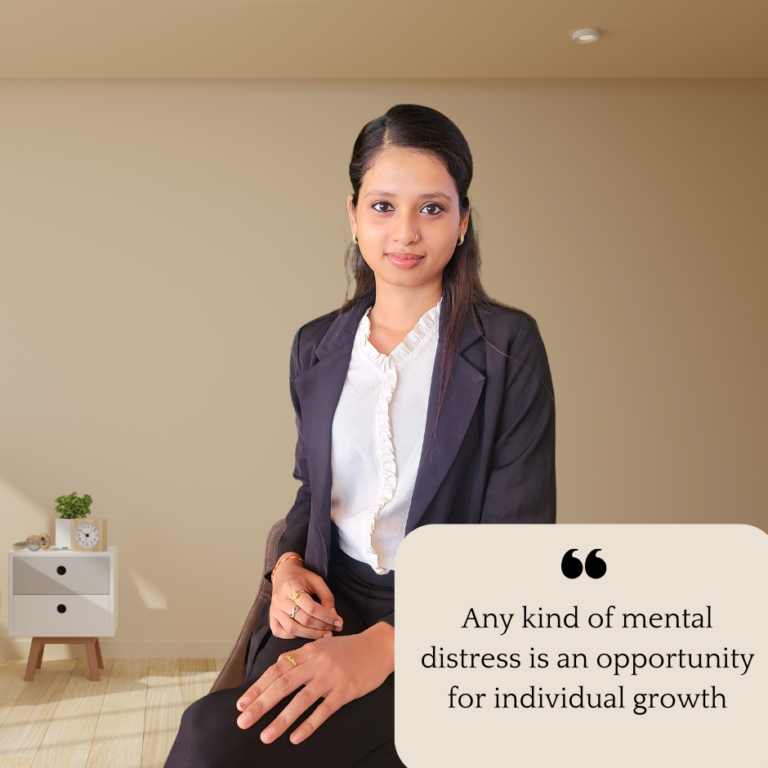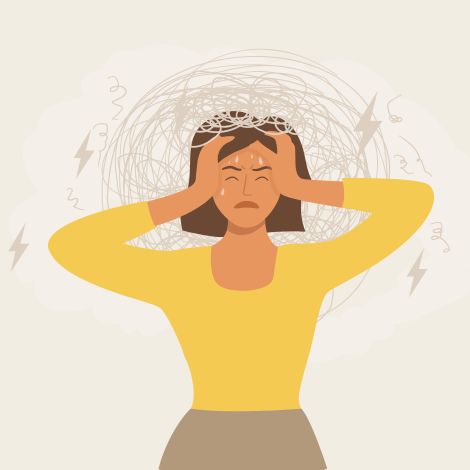Drop your details we will contact you soon!

NIDHI GUPTA
Feel calmer, think clearer, relate better—one session at a time.



HOW CAN THERAPY HELP YOU?
All of us have times in our lives when we could use some help and support. And therapy is meant to be tailored to fit your individual needs, so it can help you with a variety of challenges.
Therapy can help you with day-to-day problems (like difficulties in a relationship or body image issues), major life events (like the death of a family member or previous traumatic experiences), and personal growth (like gaining confidence or improving your self-esteem).
Therapy can also support your personal growth by helping you gain confidence, improve your self-esteem, and enhance your problem-solving skills.
Of course, therapy can also teach you coping strategies to help you manage the thoughts, feelings, and experiences that come with depression, anxiety, family conflicts, body image issues, etc. Rest assured, therapy is fully confidential, so you can feel safe sharing your thoughts and experiences without worry.

"In all chaos, there is a cosmos, in all disorder a secret order" - Carl Jung
The youth starts to make adjustment with their personality, family group,school and, opposite sex without any proper guidance. In the absence of proper guidance the adolescents grow into adults with emotional issues and struggle even with day-to-day activities .Therefore, in order to prevent occurrence of all these issues in adulthood, counselling at a young age is advised. It will help them understand themselves, the environment and their problems which helps them to make better decisions.
Some of the symptoms that you may need counselling :
- Feeling unhappy, moody, irritable most of the time.
- Feelings of emptiness or numbness
- Losing interest in activities that you once enjoyed
- Change in appetite, eating habits or weight
- Irregular sleep cycles
- Tiredness, lack of energy and motivation
- Unable to concentrate
- Feeling bad, worthless, guilty
- Recurring negative thoughts
- Suicidal thoughts or attempts
- Intense fear or anxiety
- Uncontrollable and unrealistic worry about everyday situations
- Acts of self-harm or injury as a way of coping with painful feelings
- Self-image issues
- Difficulty setting boundaries.
How can I help you ?
therapist helps people deal with their issues using therapies like personal counseling CBT, REBT, Transactional Analysis and other psychodynamic theories in order to develop a strategic personalized counselling sessions.
Depression is classified as a mood disorder. It may be described as feelings of sadness, loss, or anger that interfere with a person’s everyday activities. Depression usually involves self-loathing or a loss of self-esteem. People experience depression in different ways. It may interfere with your daily work, resulting in lost time and lower productivity. It can also influence relationships and some chronic health conditions. Depression is considered a serious medical condition that can get worse without proper treatment.
What are some of the symptoms of Depression –
- feeling hopeless, worthless, and pessimistic
- feeling sad, anxious, or “empty”
- feeling bothered, annoyed, or angry
- loss of interest in hobbies and interests you once enjoyed
- decreased energy or fatigue
- difficulty concentrating, remembering, or making decisions
- moving or talking more slowly
- difficulty sleeping, early morning awakening, or oversleeping
- appetite or weight changes
- moving or talking more slowly
- chronic physical pain with no clear cause that does not get better with treatment (headaches, aches or pains, digestive problems, cramps)
- thoughts of death, suicide, self-harm, or suicide attempts
How I can help you ?
depression is treated with different psychotherapies and personalized techniques like Gestalt therapy, CBT and REBT, based on the client’s symptoms and severity.
Anxiety is our body’s response to stress. It’s a feeling of fear or apprehension about what will or might happen. But if the feelings of anxiety are extreme, last for longer than six months, and are interfering with day to day activities, then therapy helps you manage it better. In cases of an anxiety disorder, the feeling of fear may be with you all the time. It is intense and sometimes makes you weak. This type of anxiety may cause you to stop doing things you enjoy. If left untreated, the anxiety will keep getting worse. There are several types of anxiety disorders, including generalized anxiety disorder, panic disorder, and various phobia-related disorders.
Some symptoms of general anxiety –
- Increased heart rate
- Rapid breathing
- Restlessness
- Trouble concentrating
- Difficulty falling asleep
- Nightmares
- Panic attacks
- Painful thoughts
- Feeling of fear and worry.
How can I help you?
Anxiety is generally treated with different psychotherapies like
Exposure therapy,
CBT, Gestalt therapy, postive psychotherapy and REBT, based on the client’s symptoms and severity.
Marriage counselling helps resolve conflicts between couples and improves their relationship. It helps resolve the problems between couples, either married or unmarried. Individuals having troublesome differences and stress upon the relationship can also seek relationship counselling. One of the advantages of opting therapy is that it can help to identify patterns within the relationship that lead to issues. Couples also learn how their actions and reactions affect the other person. Once the problem is known, an effort is made to recognize, and harmonize the situation so that it can be managed better.
Some of the signs that you may need marriage counselling –
- You or Your Partner Have Become Indifferent
- Almost All Communication Is Negative or Leads to Fights
- You or Your Partner Lies or Keeps Secrets
- Your Relationship Lacks Intimacy
- You or Your Partner Have Been Unfaithful
- You Find Yourselves Having the Same Argument Over and Over Again
- Feel that their partner is emotionally unavailable. Couples who feel that they have lost sexual or romantic chemistry.
- If dealing with substance abuse and mental health issues.
- Recently experienced a loss and are having trouble processing it together.
How I can help you ?
during a marriage counselling, the therapist will talk to the couple together and as individuals, in order to resolve the conflicts and to work through the issues they may be facing as a couple and as individuals.
Anger
Anger is a common response to frustrating or threatening experiences. It can also be a secondary response to sadness, loneliness, or fear. In some cases, the emotion may seem to arise from nowhere. In these cases, the emotion can hinder a person’s decision-making, damage relationships, and otherwise cause harm. Learning to control anger can limit the emotional damage.
Anger management involves a range of skills that can help with recognizing the signs of anger and handling triggers in a positive way. It requires a person to identify anger at an early stage and to express their needs while remaining calm and in control. Anger often emerges while confronting others about specific problems, situations, or grievances
What are some of the symptoms that a person with anger issues may need professional help ?
frequently feeling that they have to hold in their anger
regularly having intense arguments with family, friends, or colleagues
getting involved in fights or physical confrontations
physically assaulting a partner or child
threatening violence to people or property
breaking objects during an outburst
being in trouble with the law
losing their temper when driving and becoming reckless
anger management is done via different techniques including stress management and therapies involving CBT, REBT among others.
Stress
Stress is the body’s response to physical or emotional demands. Emotional stress can play a role in causing depression or be a symptom of it. A stressful situation can trigger feelings of depression, and these feelings can make it more difficult to deal with stress.
Some of the symptoms that you may have stress are –
- pain in the back or chest
- cramps or muscle spasms
- fainting and headaches
- burnout
- concentration issues
- fatigue
- a feeling of insecurity
- food cravings and eating too much or too little
- sudden angry outbursts
- drug and alcohol misuse
therapist help an individual deal with stress by going to the underlying cause using therapies like CBT, Exposure therapy and other psychodynamic theories in order to develop a strategic personalized treatment plan.
Work life balance
A healthy work-life balance will have different meaning to every individual. It’s not so much about splitting your time 50/50 between work and leisure, but to make sure you feel fulfilled and content in both areas of your life.
Signs that your work and life may be out of balance include but are not limited to –
- Bringing work home
- Increased arguments with family members about time spent working
- Cancelling family plans or social plans for work
- Poor sleep and work-related dreams
- Teeth grinding during sleep
- Short temper with family members
- Upset stomach digestive issues
- Tension headaches
- Increased caffeine/alcohol use
therapist helps you learn to set limits and boundaries with others that will help improve your work-life balance.
use different therapies including CBT, REBT and psychoanalytic behavioral therapy among others, to help you regain control of your life.
Individual Counselling we create a safe environment for individuals to break out of the feelings like isolation, sadness, shame, powerlessness and anger among many other emotions that we as humans feel. It is a one-on-one counselling session where the therapist helps them to have a better understanding of themselves and others, and to set personal goals, and to work towards a desired change for a healthier and happier life.
Some of the symptoms that you can seek counselling :
- Difficulty falling asleep
- Nightmares
- Anxiety
- Depression
- Panic attacks
- Painful thoughts
- Feeling of fear and worry
- Difficulty communicating or expressing emotions
- Adverse childhood experiences (ACE
- Social pressure
- Lack of family support or involvement
How I can help u ?
The therapist helps people deal with their issues by going to the underlying cause using therapies like CBT, REBT, Transactional Analysis and other psychodynamic theories in order to develop a strategic personalized treatment plan.
Counselling for parents focuses on ways to help improve the important relationships in your life especially with your partner and children. It aims to provide the necessary knowledge, tools, guidance, and most importantly support to parents without bias or judgment. This way, they become more equipped to take care of their relationships with others, especially children.
How to know if you as a Parent need Counselling ?
You face trouble in implementing routines for your family
You are not able to deal with children when they refuse to take instructions
You are not able to manage your child’s behavior effectively
Problems in your marriage, such as finances and infidelity, have a negative impact on your children
You are suffering from a health problem which prevents you from spending time with your family, especially your children
Your child is facing teenage issues
You are not able to connect with or communicate effectively with your child
Grief or loss in the family
How can I help you?
the therapist helps parents deal with the issues they are facing by going to the underlying cause using therapies like CBT, exposure therapy and other psychodynamic theories in order to develop a strategic personalized treatment plan.
Trauma-Focused therapy
Trauma-Focused therapy recognizes and emphasizes on understanding how the traumatic experience impacts an individual’s mental, behavioral, emotional, physical, and spiritual well-being. The purpose of trauma-focused therapy is to offer skills and a personalized strategic plan to assist you with a better understanding, helping you cope with emotions and memories tied to those traumatic experiences.
This type of therapy is rooted in understanding how an individual’s emotions and behavior is affected by traumatic experiences.
Benefits of Trauma-Informed Therapy :
- Helps Identify triggers
- Address the root concerns
- Develop healthy coping mechanisms
- Decreased symptoms over-time
- Setting Healthy Boundaries
How can I help you ?
The therapist uses different therapies including CBT, REBT, behavioral therapy among others, to help you realize, recognise, and address issues of guilt and shame that trauma survivors often carry.
Posttraumatic stress disorder
Posttraumatic stress disorder (PTSD) is a condition that may occur in people who have experienced or witnessed a traumatic event such as serious accident, rape, threatened with death, sexual violence, serious injury, a terrorist act, or war/combat. Most people who go through traumatic events may have temporary difficulty adjusting and coping. Many individuals develop symptoms within three months of the trauma, but symptoms may appear later and often persist for months and sometimes years. PTSD often occurs with other related conditions, such as depression, substance use, memory problems and other physical and mental health problems.
Symptoms that you may have PTSD :
- Intrusive thoughts
- Repeated
- Involuntary memories
- Distressing dreams
- Flashbacks
- Avoiding people, places, activities, objects and situations that may trigger distressing memories.
- resist talking about what happened or how they feel
- distorted thoughts about the cause or consequences of the event
- feeling detached or estranged from others
- Unable to experience positive thoughts
- Behaving recklessly or in a self-destructive way
- having problems concentrating or sleeping
- Being overly watchful of one’s surroundings in a suspecting way
- Changes in physical and emotional reactions.
How can I help you ?
the therapist helps people deal with PTSD by going to the underlying cause using therapies like CBT, Prolonged Exposure therapy, Stress Inoculation Therapy, and other psychodynamic theories in order to develop a strategic personalized treatment plan.
Grief is a multifaceted response to loss, particularly to the loss of someone or something that has died, to which a bond or affection was formed.
Some of the symptoms that you may need counselling to cope with loss :
- Shock
- Numbness
- Sorrow
- Yearning
- Anger
- Denial
- Helplessness
- Regret
- Guilt
- Anxiety
How I can help you?
the therapist uses techniques involving but not limited to CBT, Acceptance and Commitment Therapy (ACT), REBT in order to help the individual cope up with their loss in a way that is healthy and helps develop a treatment plan for the overall wellbeing of the individual.
As a parent, you want what is best for your child. You want to take care of them and provide them with whatever support and resources they need to thrive. It can be challenging to know what those resources are, though. So, how do you know if your child might need therapy?
Signs Your Child Might Benefit from Therapy
- There has been significant change in their mood.
- Their behaviour has changed.
- They have experienced a stressful or traumatic event.
- They have engaged in self-harm behaviour.
- They have expressed suicidal ideation.
How I can help you ?
Play Therapy for Young Children often feel safer opening up emotionally when they are engaged in play. In addition, children often act out real-life scenarios through play, which provides a lot of information to the therapist about what the child is coping with. Play also provides a low-pressure scenario during which a therapist can build a connection with a child.
Talk Therapy
Teenage might engage in talk therapy but spend much of their session discussing things that the parent might not think is “relevant” to their presenting issues. What your teen feels is important to cover in therapy might not perfectly line up with your perception.
Behaviour therapy
Applied behaviour analysis uses operant conditioning to shape and modify problematic behaviors
Cognitive behavioural therapy (CBT) relies on behavioural techniques, but the difference is that CBT adds a cognitive element, focusing on the problematic thoughts behind behaviours.
Cognitive behavioural play therapy utilizes play to assess, prevent, or treat psychosocial challenges. The therapist may use play to help a child learn how to think and behave differently.
Exposure therapy utilizes behavioural techniques to help people overcome their fears of situations or objects. This approach incorporates techniques that expose people to the source of their fears while practicing relaxation strategies. It is useful for treating specific phobias and other forms of anxiety.
Robert carkuff counseling model
The Robert Carkhuff model of Personal Counselling, which is an offshoot of Carl Roger’s Client-Centred Therapy (based on HUMANISTIC PSYCHOTHERAPY).
Transactional analysis
A Cutting Edge Technique & Approach for Self-Awareness & Relationship Management. The Most Effective Communication Strategies
Mastery in Defusing Potentially Heated & Difficult Situations
Strategies to Enhance Self-Insight in Oneself & in Clients
The Ability to Work towards Negotiated Outcome
Effective counselling tools that answer the question ‘How did I become this way’ & ‘Why does this always happen to me?’
A Potent Toolkit to Raise the Quality of one’s Analytical Repetoire while being a Therapist
Rational Emotive Behavior Therapy (REBT)
What creates emotions and motivates behavior in human beings.
How to identify dysfunctional thinking and what to replace it with.
The process of therapy and specific techniques to achieve rapid and lasting change.
How to practice REBT on yourself – ‘Rational Self-Analysis’.
How to apply REBT to emotional problems in clients; especially depression, anxiety, anger, guilt, addiction, and relationship problems.
The good life is a process, not a state of being. It is a direction, not a destination.
-Carl Rogers
